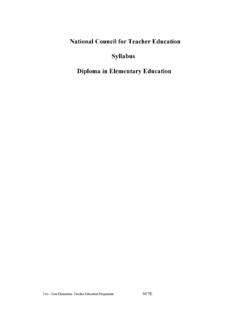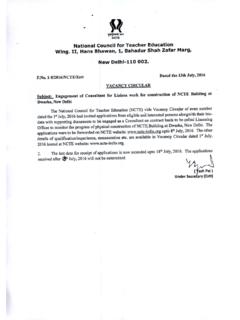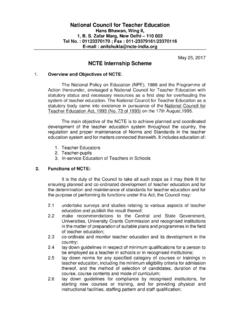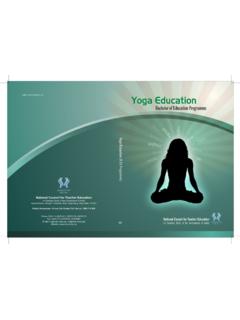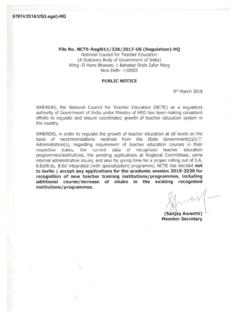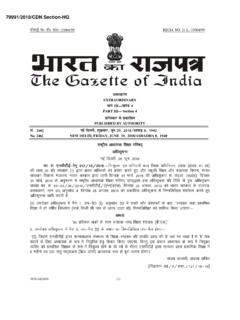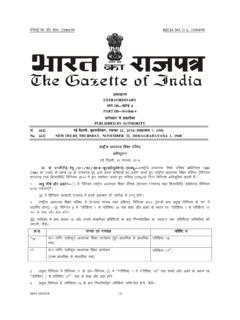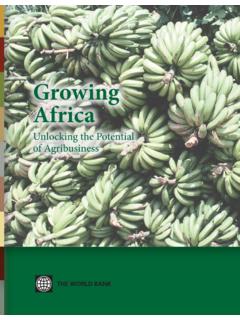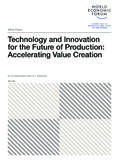Transcription of A ranking and accreditation framework for TEIs - NCTE
1 Te a c h R. unlocking the potential of teacher education in India a ranking and accreditation framework for TEIs Draft (version ). June 2017. 1. Te a c h R. unlocking the potential of teacher education in India a ranking and accreditation framework for TEIs Draft (version ). Please continue to check for updated versions. The final document will have changes made based on feedback received from all stakeholders. June 2017. " O u r Te a c h e r s , O u r H e r o e s ". Glossary API Application NCTE National Council Program for Teacher Interface Education ASK Attitude, Skill, NIRF National and Knowledge Institute ranking framework AV Audio Visual NTP National DA Desktop Teacher Assessment Platform DIET District Institute POC Point of Contact of Education and Training QCI Quality Council of India ICT Information and Communication QRT Quick Response Technology Team IT Information SEF Self Evaluation Technology Form LMS Library TA Traveling Management Allowance System TEI Teacher LOI Letter of Intent Education Institute MHRD Ministry of Human TET Teacher Resource Eligibility Test Development TLM Teaching- NAAC National Learning Assessment and Material accreditation Council Table of Contents Context 5.
2 Theory of Change 7. Overview of framework 8. Methodology 11. Step 1: Registration on TeachR web portal 12. Step 2: Successful completion of self-evaluation form 12. Step 3: Assessment process 14. Step 4: ranking and accreditation 16. Fee 18. Timelines 19. Who Must Undergo Mandatory Assessment 20. Conclusion 21. Annex: Sub-Components of framework 22. Context The National Council for Teacher Education (NCTE), is a statutory body created by National Council for Teacher Education Act (NCTE Act), 1993. It is mandated with the planned and co-ordinated development of both pre-service and in-service teachers throughout the country. Faced with a crisis of quality in the pre-service training of teachers, NCTE vide notification dated 28th April 2017, in the exercise of its powers under sub-section 2 of section 32 of the NCTE Act, 1993, introduced an amendment to Regulation 8(3).
3 According to this amendment, an institution recognized by NCTE is now required to obtain accreditation from an agency identified by it once every 5 years. Additionally, it was decided, for the first time, to rank the top 100 TEIs in the country once every 2 years. NCTE is taking these steps with a view to helping prospective student teachers make informed choices about the TEI they should select to improve their chances of: 1. Acquiring the Attitude, Skill and Knowledge (ASK). required to become a good teacher and, 2. Passing the teacher eligibility test (TET), a mandatory requirement to become a teacher in both government and private schools in India Until now, the agency designated by NCTE for accreditation was the National Assessment and accreditation Council (NAAC).
4 Between 2002 and 2017, NAAC could accredit only 1522 TEIs in the country. Given an estimated total of 16000 to 18000 TEIs that now need to be accredited, NCTE took a decision to discontinue the mandate given to NAAC and instead work with the Quality Council of India (QCI), an autonomous agency under the Department of Industrial Policy and Promotion, Government of India1. Over the last 3 months, NCTE has been working with QCI to design and operationalise a new accreditation and ranking 1. The Chairperson of QCI is nominated by the Prime Minister of India. The current chairperson is Mr. Adil Zainulbhai, an alumnus of Harvard Business School and former Chairman of McKinsey in India. 5. TEACHR ranking And Accredit ation Fr amework For TEIs Context framework .
5 This builds on recent efforts to obtain affidavits from TEIs2, in which affidavits or show-cause notices were submitted by 11,474 TEIs across the country. Further, 1449. courses were recognised between 13th December 20163 and 2nd May 2017. A list of these TEIs has been published at TEIs who submitted the affidavit or show-cause are now required to log on to the TeachR portal and update the information they had submitted and provide additional information as indicated. Those TEI's who did not submit the Affidavit or showcause are required to submit the affidavit and the additional information immediately. Going forward, this accreditation and ranking framework will be first implemented in the State of Bihar. This is in compliance of the orders of the Honourable Patna High Court in CWJC.
6 No. 9230/2016 Dr. Ambedkar College of Education vs. the State of Bihar and others4. This will be followed by a pan Indian roll out. TEIs across the rest of the country are therefore required to register on the TeachR platform immediately and submit the necessary details. 2. NCTE had launched an online Mandatory Affidavit system (MAS) on and the final date for submission was , which was extended to Thereafter, NCTE, by Public Notice dated , gave an opportunity to TEIs for submitting reply to Show Cause Notice, failing which, the NCTE shall be constrained to initiate processes leading to consequential action of withdrawal of recognition under Section 17 (1) NCTE Act, 1993. The last date for submission of reply to Show Cause Notice was The said deadline was further extended to 3.
7 12th December 2016 was the last date for submitting Affidavits. 4. The High Court called for inspections of all Teacher Education Institutions in the state of Bihar by specially constituted teams, to be concluded in a time-bound manner. 6. Theory of Change The issue of learning outcomes for children in India has been highlighted as a chronic and severe risk to leveraging our demographic dividend. The literature on education highlights that teacher quality is an important determinant of learning outcomes. However, the average quality of teaching, a key determinant of learning outcomes, is far below any reasonable standard. Besides, it is widely acknowledged that the current regulatory framework for TEIs does not promote academic excellence; and, it provides very little information that can be used by prospective students to make informed choices while deciding which TEI to enroll in.
8 Together these make for a dangerous cocktail that provides very little impetus for reform. NCTE, therefore, seeks to correct this by developing and deploying the TeachR framework . Through the implementation of this framework , NCTE aims to unlock the potential of TEIs to provide better learning outcomes for their student teachers, and eventually for all students across India by laying out a framework for ranking and assessment of TEIs that privileges academic excellence above all else. The new framework is distinctive in its approach. It rebalances the emphasis between inputs such as land, building, teachers, and outputs such as learning outcomes by emphasizing the latter. It also recognizes the need to have a variety of teaching methods and therefore uses both qualitative and quantitative tools, while taking a long-term view to sustaining excellence through regular assessment and ranking .
9 Through the implementation of TeachR, well-intentioned TEIs will have the right incentives to continuously strive to improve, and those engaged in malpractice will be forced to exit the sector. potential student teachers will have the information they need to make an informed choice on the TEI they should seek to enroll in. As a result, TEIs will compete to provide better education to attract better teachers. Unleashing this virtuous cycle is at the heart of NCTE's efforts to drive change in the teacher education sector. 7. Overview of framework The TeachR framework for ranking and accreditation is designed to provide a thorough, holistic assessment of TEIs. Beyond the physical assets and rudimentary academic assets in the original framework , it gives maximum weightage to teaching and learning quality as well as learning outcomes.
10 This enables the creation of a fairer and more complete picture of TEI. quality. The four pillars of the framework are described below: 1. Physical Assesses the availability and optimal utilization of assets infrastructural facilities. Involves comprehensive on-site assessment of financial management, and infrastructure compliance. This will have a total score of 10 out of 100. 2. Academic Evaluates the compatibility of the curriculum with the vision Assets and scope of the institute and steps it is taking to promote research and consulting while offering quality academic support to their student teachers and teacher educators. Resources such as teaching and learning materials (TLMs), qualifications of faculty and research output will be considered.

